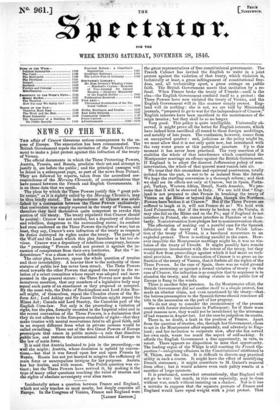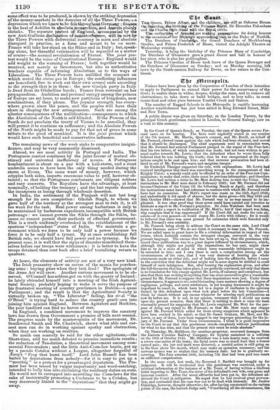Incidentally arises a question between France and England, which not
only touches us most nearly, but deeply concerns all Europe. In the Congress of Vienna, France and England were [LATEST EDITION.]
the great representatives of free constitutional government. The French Cabinet has invited the English to unite in a joint protest against the violation of that treaty, which violation is, technically at least, a gross infringement of constitutional free- dom, and, all technicality apart, a gross outrage on public faith. The British Government meets that invitation by a re-
fusal. When France broke the treaty of Utrecht—such is the plea—the English Government confined itself to a protest : the Three Powers have now violated the treaty of Vienna, and the English Government will in like manner simply protest. Enj- land will do nothing : she is not, we are told by Ministerial journals, "prepared to go to war for the independence of Cracow." English interests have been sacrificed to the maintenance of fo- reign treaties ; but they shall be so no longer. Very good: This policy is quite intelligible. Universally ob- served, it might prove all the better for English interests, which
have indeed been sacrificed all round to these foreign meddlings, and notably of late years. The confession, however, comes from an unexpected quarter : and, judicious as the policy might be, we must allow that it is not only quite new, but introduced with the very worst grace at this particular juncture. Up to this moment it has never been practised. The very assertion of it stultifies the whole of that interference which constituted the Montpensier marriage an offence against the British Government. If England is to adopt the discreet Jeffersonian policy of non- intervention, the whole of that quarrel must vanish into air. We trust that this anomalous and equivocal passiveness, totally isolated from the past, is not to be as isolated from the future. We hope the startling conversion is a thorough reform ; and that we shall see its effects not only at Cracow, but in Spain, Portu- gal, Turkey, Western Africa, Brazil, North America. We pre- sume that it will be observed in Italy. We are told that "Eng- land is not prepared to abet France in breaking the treaty of Vienna on *e Rhine or beyond the Alps, though the Northern Powers have broken it at Cracow." But if the Three Powers are suffered to laugh at it, will not France do so ? We hold with Lord Palmerston, that if the treaty be broken on the Vistula, it may also fail on the Rhine and on the Po; and if England do not interfere in Poland,: she cannot interfere in Flanders or in Lom- bardy. Nonintervention here pledges her to nonintervention there. The affectation of making out a parallel case for the Spanish infraction of the treaty of Utrecht and the Polish infrac- tion of the -treaty of Vienna, is a barefaced recurrence to an exploded pretext. There is nothing parallel in the cases. How- ever impolitic the Montpensier marriage might be, it was no vio- lation of the treaty of Utrecht. It might possibly have remote consequences inconsistent with the intent ot the treaty, but they would flow from proceedings against which it had made no tech- nical provision. But the annexation of Cracow is so gross an in- fraction of the treaty of Vienna, that it forfeits all the rights of the Three Powers. In the case of Spain, there was no valid ground even for protesting as against a formal violation of treaty : in the case of Cracow, the infraction is so complete that to acquiesce is to abandon the treaty, and the ruling statute in the public law of Europe is flung to the winds. There is another false pretence. In the Montpensier affair, the British Government did not confine itself to a simple protest, but made an ulterior claim, not even sanctioned by the treaty—that.. the heiress presumptive to the Spanish throne should renounce all title to the succession on the part of her progeny.
We do not stop to consider the inconsistency of the present course with former declarations in Parliament; for if there were good reasons now, they would not be invalidated by the utterance of bad reasons in August last. Let the case be judged on its merits.
There is, no doubt, a fault in the position of France. Apart from the question of treaties, she, through her Government, chose to act in the Montpensier affair separately, and adversely to Eng- land; and her invitation to cooperate now, after she has served her own ends, wears too much the aspect of self-seeking. It affords the English Government a fine opportunity, in turn, to retort. There appears no disposition to miss that opportunity. The leading organ of the Whigs is still courting the French Op- position f—eulogizing effusions in the Constitutionnel attributed to M. Thiers, and the like. It is difficult to discern any practical utility in such a course. It might have the effect of mortifying French statesmen; it might contribute to M. Guizot's removal from office; but it would achieve even such paltry results at a ' sacrifice of large interests.
It is proclaimed, somewhat ostentatiously, that England will not go to war: but much, in this case especially, may be done i without war, much without insisting on a shadow. Nor s it less a mistake to suppose that the separate protests of France and England would have equal weight with a joint protest. That
some effect was to be produced, is shown by the striking depression of the money-markets in the domains of all tie Three Powers,-ra depression which we know tube felt througllout Gerniank:finimsw, is the heel of Achilles in absolute monarchiesi and Amapa plainglzi shrinks. The separate protest of England, accompanied by the new Anti-Gallican .declikrstion of noninterferme, will be met Iwy, the Three Powers with deferential courtesy m mien and'absointe disregard in practice, as a form and meant to be no more. France will take her stand on the Rhine and in Italy ; but, speak- ing alone, her threatful vaticination will be regarded as a matter of course—the normal revolutionism of France. The joint pro- test would be the voice of Constitutional Europe : England would add weight to the warning of France; both together would be received, not merely as threateners, but also as authoritative teachers capable of informing Absolutism as to the ways of Liberalism. The Three Powers have nullified the compact on which rested the status quo in Europe ; the conflicting influences are henceforth free to work out their own several ends according to the strength that is in them : the new Guelph party in Italy Is freed from its Ghibelline bonds ; France from restraint on her propagandism. Ambition and personal energy among the princes of Europe are set loese, to make new partitions of kingdoms, new combinations, if they please. The popular strength has every- where grown since the peace, and the peoples will have their share in shaping the new arrangements. Such are among the ulterior consequences of the nullification—consequences to which the Absolutism of the North is self-blinded. If the Powers of the South do not proclaim the treaty of Vienna to be annulled, they will permit it to continue on sufferance; and the Absolute Powers of the North might be made to pay for that act of grace in some tribute to the good of mankind. It is the joint protest which would have such beneficial and conservative mfluence.



























